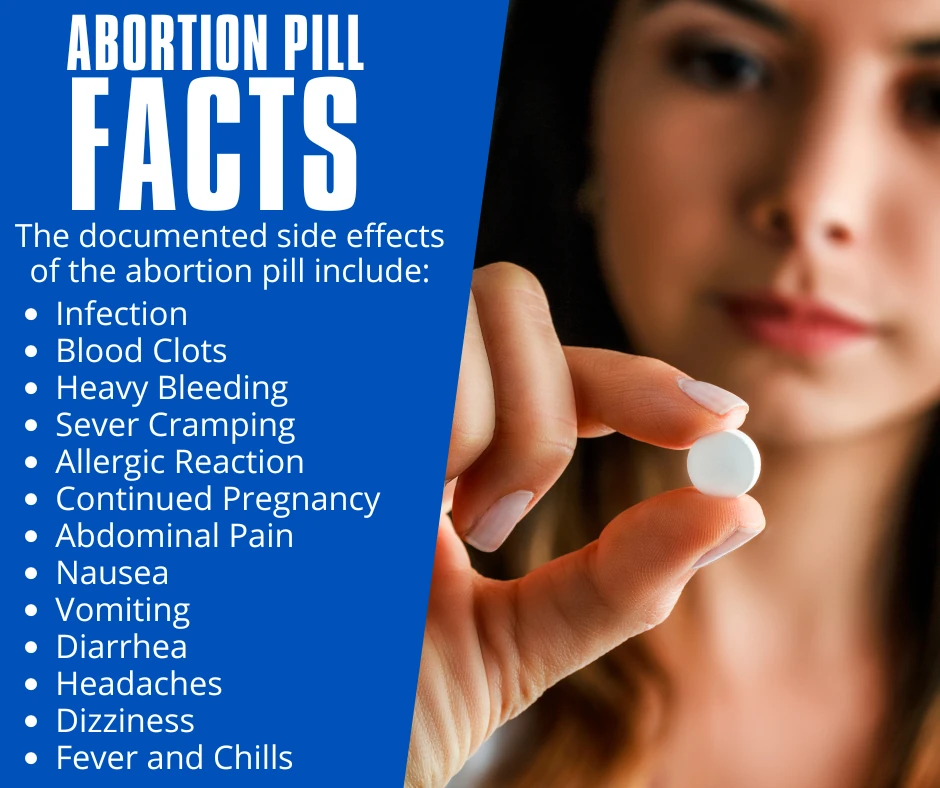
Kansas Abortion Pill Information

Abortion Pill
The abortion pill is a medical abortion. This type of abortion uses two drugs. The first medication (Mifepristone ) blocks the progesterone hormone which is needed for pregnancy to continue. When used together with the second medication (Misoprostol), it will end an early pregnancy (70 days or less since the first day of the last menstrual period or 10 wks LMP) and is considered unsafe beyond that time.
The pill, mifepristone, causes an abortion by blocking the hormone progesterone, which is necessary for pregnancy to continue. The abortion pill is administered in three doses, along with another drug, misoprostol, and typically requires three clinic visits.
On the first visit, the woman takes three mifepristone abortion pills, which results in the death of the fetus.
On Day 3, she takes the second abortion pill, misoprostol, which will cause cramping to expel the fetus.
A follow-up visit is required two weeks after taking the abortion pill to ensure that the pregnancy has terminated. If an ultrasound scan shows that the fetus has not been expelled, a surgical abortion will be required, typically at an additional cost.
Other names for the abortion pill (Ru486):
Mifepristone is the generic name for RU-486. In the U.S., RU486 is sold under the brand names Mifeprex® and Early Option®.
The abortion pill involves two drugs:
When taken alone, RU486 results in a complete abortion only about 60% of the time. A second drug, a prostaglandin, is given 48 hours later to increase the abortion pill’s effectiveness. The prostaglandin causes uterine contractions to help expel the fetus. Misoprostol (brand name Cytotec) is the prostaglandin used with RU-486 in the U.S.
In Kansas the Abortion Pill is now available by mail. Before taking the Abortion Pill or any other medication, get information from a trusted source so that you understand how it works and the possible side effects.
Who Should not take the abortion pill (ru486):
The FDA advises that the Medication abortion pill (RU486) should NOT be taken if any one of the following circumstances apply:
- It has been more than 49 days since your last menstrual period began.
- You have an IUD, which must be removed before taking the pill.
- Your healthcare provider has told you that you have an ectopic pregnancy (a pregnancy outside the uterus). Note: About 2% of pregnancies are ectopic.
- You have problems with your adrenal glands (chronic adrenal failure).
- You take a medicine to thin your blood.
- You have a bleeding problem.
- You take certain steroid medications.
- You cannot return for the necessary follow-up visits (2 days and 14 days after taking RU-486).
- You cannot easily access emergency medical help, including blood transfusions and emergency resuscitation, in the 2 weeks after taking the medication abortion pill.
- You are allergic to mifepristone [RU-486], misoprostol, or medicines that contain misoprostol such as Cytotec or Arthrotec.
Adverse events and side effects of the abortion pill:
In U.S. trials of RU486/misoprostol, at least 99% of patients experienced at least one of the following medication abortion pill side effects:
- Abdominal pain (cramping) (97%)
- Nausea (67%)
- Headache (32%)
- Vomiting (34%)
- Diarrhea (23%)
- Dizziness (12%)
- Fatigue (9%)
- Back pain (9%)
- Uterine hemorrhage (7%)
- Fever (4%)
- Viral infections (4%)
- Vaginitis (4%)
- Rigors (chills/shaking)(3%)
More than one adverse event was reported for most patients. Approximately 23% of the adverse events were judged to be “severe.”
The FDA is aware of women in the United States who died from sepsis (severe illness caused by infection of the bloodstream) after medical abortion with Mifeprex and misoprostol.
Calculating the Length of Pregnancy:
Doctors calculate the length of pregnancy by counting from the first day of the last menstrual period (LMP), approximately two weeks prior to conception (fertilization). So “up to 49 days LMP” means up to 5 weeks after conception.
Understanding the details and implications of choosing the medication abortion pill is crucial for anyone considering this option. It’s important to be fully aware of the time constraints, procedure, potential side effects, and risks involved with this form of abortion. The use of RU486, coupled with misoprostol, is a significant medical decision that should be made with comprehensive knowledge and under professional medical guidance.
For those considering this option, it’s vital to consult with healthcare professionals to ensure safety and to discuss any concerns or questions you might have. It’s equally important to understand the legal and health criteria that determine eligibility for taking the medication abortion pill. Remember, this decision is not just about the immediate termination of pregnancy but also involves considering your long-term health and well-being.
If you or someone you know is facing an unplanned pregnancy and contemplating a medication abortion, consider reaching out to your local Kansas pregnancy center for detailed information and support. Making an informed decision is essential, and it’s important to have access to all the facts and support systems available. Remember, you are not alone in this journey, and there are resources and people ready to help you through this process.
Abortion Pill Frequently Asked Questions
Question: How Much Does the Abortion Pill Cost?
Answer:
The typical cost of the abortion pill ranges from $350 to $700, and it may be even higher depending on the provider. For the information you need, determine how far along you are in your pregnancy with our complimentary ultrasound services.
Question: How Can I Get the Abortion Pill?
Answer: You can get an abortion pill either through an abortion provider’s clinic or by an online mail source. For mail order, in most cases, a telehealth appointment is required and the medication for the abortion is sent directly to you without an in-person physical examination. A physical examination is important because it dates the pregnancy, rules out ectopic pregnancy, and determines viability (if you are at risk for miscarriage).
Question: What are “Missed Period Pills?
Answer: sed period pill is another name for the abortion pill. Some people may think it might help them psychologically if they’re unsure about abortion. Regardless of its name, you should know that it is an abortion.
Kansas Pregnancy Centers
Kansas pregnancy centers are located in all major cities including Wichita, Overland Park, Kansas City, Olathe, Topeka, Lawrence, Shawnee, Manhattan, Lenexa, Salina, and even many smaller cities.
Most Kansas pregnancy centers listed offer free and confidential services including medical grade pregnancy tests and ultrasound exams.
305 S Summit St
Arkansas City, KS 67005
620-442-1688
Branches Pregnancy & Family Resource Center
510 State Street
Augusta, KS 67010
316-775-9372
Heart Choices
602 West 6th St.
Beloit, KS 67420
785-738-3433
Midwest Pregnancy Care Center
912 Walnut Street
Coffeyville, KS 67337
620-251-0900
Emergency Pregnancy Service
350 S Range
Colby, KS 67701
785-462-3022
Heart Choices
910 W. 11th St
Concordia, KS 66901
795-262-7138
Dodge City Pregnancy Support Center
2601 Central Ave #LL43
Dodge City, KS 67801
620-682-3015
Branches Pregnancy & Family Res Center
226 S. Main Street
El Dorado, KS 67042
316-322-0070
Birthline
1101 Scott Ave
Fort Scott, KS 66701
316-223-6853
ABC Pregnancy Care Center
509 N. 6th Street
Garden City, KS 67846
620-275-1777
Hope's Place
902 W. Old Highway 24
Goodland, KS 67735
785-890-4357
Birthright
214 E Third St
Hutchinson, KS 67504
620-663-5872
Open Door Pregnancy Care Center
315 W. 1st Ave.
Hutchinson, KS 67501
620-728-2229
Midwest Pregnancy Care Center
213 E. Main Street
Independence, KS 67301
620-331-0700
Junction City Pregnancy Center
823 N. Washington St
Junction City, KS 66441
785-579-5799
Olathe Wyandotte Pregnancy Clinic
3021 N 54th Street
Kansas City, KS 66104
913-287-8287
Sparrow Women's Clinic
100 E. Kansas Street, Suite E
Lansing, KS 66043
913-543-4446
3210 Mesa Way
Lawrence, KS 66048
785-842-6499
Birthright
221 Delaware Street Ste. A
Leavenworth, KS 66502
913-682-2700
Life Choice Ministries
1441 Anderson Ave
Manhattan, KS 67114
785-776-9406
Hope's Women's Center
717 N. Main
Newton, KS 67114
316-283-7333
Olathe Pregnancy Clinic
1313 E Santa Fe
Olathe, KS 66061
913-289-0100
Life Care Pregnancy Center
121 E. Second Street
Ottawa, KS 67423
785-242-4500
Heart Choices
117. N 1st Street
Osborne, KS 66211
785-345-3316
Advice & Aid Pregnancy Center
10901 Granada Lane, Suite 100
Overland Park, KS 66211
913-398-3445
Vie Medical Clinic
615 N. Broadway
Pittsburg, KS 66967
620-235-0605
Heart Choices
120 W. Kansas Street
Smith Center, KS 67401
785-686-3048
Pregnancy Service Center
104 W. Elm Street
Salina, KS 66608
785-823-1484
Mary's Choices
551 NW Broad Street
Topeka, KS 67203
785-246-6805
Birthline
339 N Sebeca
Wichita, KS 67218
316-265-0134
Choices Medical Clinic
538 S. Bleckley
Wichita, KS 67214
316-687-2792
A Better Choice
3007 E Central Ave
Wichita, KS 67203
316-799-0827
Embrace
1040 N West St
Wichita, KS 67203
316-945-9400
Kansas is located in the central United States and is known for its vast plains, agricultural prowess, and rich historical heritage. The largest city is Wichita. Kansas features a predominantly flat landscape with rolling prairies and a climate characterized by hot summers and cold winters. As of 2022, the population of Kansas is projected to be 2.937 million. Universities in Kansas include: The University of Kansas, Kansas State University, Wichita State University, and many other colleges and universities. The capital is Topeka, Kansas
Frequently Asked Questions
Question: Do I need an appointment?
Answer: Walk-ins are welcome. However, it is best to make an appointment to minimize your office wait time.
Question: What is the cost?
Answer: All services are free and confidential.
Question: What should I expect when I come for my visit?
Answer: Upon your arrival, a friendly receptionist will guide you to meet your client advocate. This advocate will offer you a judgment-free space to talk, followed by essential information and a pregnancy test. In the event of a positive test result, a dedicated medical professional will perform a limited ultrasound to verify the pregnancy's viability and estimate the age of the fetus.
Question: How long after sex does it take for a pregnancy test to work and how accurate is the test?
Answer: Pregnancy tests can be performed 7 to 10 days after conception. A client with a negative result may be invited to return within 2 weeks for a repeat test if she has not had her period.
If you have taken a home pregnancy test, you may want to confirm results with a laboratory-quality test at your local pregnancy center. These pregnancy tests detect HCg levels within 7 to 10 after conception.
Question: Will you tell anyone about my visit?
Answer: Pregnancy centers maintain a rigorous privacy and confidentiality policy. Clients' information is safeguarded against unauthorized disclosure, respecting their right to privacy, except in instances mandated by law. This includes situations necessary for public health, preventing harm to the client or others, or in specific circumstances where the use or disclosure of information is justified without prior consent, such as in cases of abuse reporting or suicide/homicide prevention.
Question: When should I schedule an appointment?
Answer: High-quality, medical-grade pregnancy tests are capable of detecting pregnancy from the first day after your initial missed period. We advise scheduling an appointment if you've missed a period, have any queries related to pregnancy, or suspect that you might be pregnant.
Question: How far along do I have to be to get a free ultrasound?
Answer: After an initial consultation with a client advocate, many pregnancy centers offer on-site ultrasound scans. These limited ultrasounds are conducted by a licensed nurse sonographer or a registered diagnostic medical sonographer (RDMS) and are subsequently reviewed by a licensed physician. The purpose of an ultrasound is to confirm the viability of the pregnancy and to establish the gestational age.
Question: I already know I'm pregnant and I want an abortion, what's next?
Answer: It is advisable to have an ultrasound to confirm the viability of your pregnancy and to ensure it is located within the uterus, as 20% to 25% of pregnancies end in miscarriage. Moreover, the ultrasound helps in determining the stage of your pregnancy, which is essential in making an informed decision about the type of abortion procedure you may consider. Many pregnancy centers offer a limited ultrasound free of charge.








